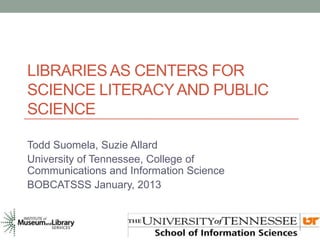
BOBCATSSS 2013 - Suomela, Allard - Libraries as Centers for Science Literacy and Public Science
- 1. LIBRARIES AS CENTERS FOR SCIENCE LITERACY AND PUBLIC SCIENCE Todd Suomela, Suzie Allard University of Tennessee, College of Communications and Information Science BOBCATSSS January, 2013
- 3. How to communicate science? • The world is becoming more complex • Increasing levels of technology and scientific knowledge • Easier to share across wide areas • Grand challenges for science • How do scientists communicate large-scale issues like global warming among themselves? • How do scientists communicate to the public? • Examples: global warming, nuclear power, genetically modified organisms, vaccine use
- 4. Science Communication Deficit • Laypeople just need more education to understand the model issues and concepts • Laypeople have local Lay expertise that can be harnessed to help expertise understand a problem
- 5. Science communication • Laypeople understand Contextual model based on their contextual experiences • Laypeople should be Public understanding integrated into science and technical discussions
- 6. Public understanding • A more sophisticated understanding of science communication • Framing effects are present • Emotion, class, and other background factors effect the transmission of scientific knowledge to the public • Brings in democratic theory and practice • Builds a forum for communication between scientists and laypeople • Does not put one group above the other
- 7. Citizen science – an opportunity To bring public and science together.
- 8. THE ROLE OF LIBRARIES
- 9. Citizenship and obligation Data Literacy sharing Future of libraries
- 10. Literacies of different kinds Information Literacy Science Literacy • Information literacy has • Increasingly important for become increasingly reasons of economic important to the library development and political community over the past decision-making 40 years (Rader, 2002) • Needed to face the grand • A global concern challenges of the future throughout the world for librarians and other professionals
- 11. Fitting into the mission Citizen science may be a way to fit into the mission of modern libraries. “promote[s] libraries as vital institutions that enhance people’s lives through equitable access to knowledge and information” (IFLA Strategic Plan)
- 12. Lessons from Lorcan • Moving away from collections to the creation of knowledge. • Citizen scientists are doing this now and we can help. • Discovery happens elsewhere • People outside the academy need our help in order to learn how to discover but also to publicize their successes. • Libraries have been hidden • We don’t have to be hidden. We can can engage the public where it lives and where it is working.
- 13. Discussion • How can we bring libraries and science together? • Let’s talk about this… • tes@utk.edu • Putting a scientist in the library • Building spaces where people can do science – becoming laboratories for understanding the world • Meeting spot between government policy and the effect upon the public
- 14. Sources and References • Mount Rainer NPS, http://www.flickr.com/photos/mountrainiernps/6997771177 / • Rader, H. B. (2002). Information Literacy 1973-2002: A Selected Literature Review. Library Trends, 51(2), 242. • Brossard, D., & Lewenstein, B. V. (2009). A Critical Appraisal of Models of Public Understanding of Science: Using Practice to Inform Theory. In L. Kahlor & P. A. Stout (Eds.), Communicating Science: New Agendas in Communication. London: Routledge.
Hinweis der Redaktion
- Mention the importance of science communication and why it matters to society.
- Citizen science is the participation of non-scientists in scientific research.Why does it arise? Changes in technology enable new forms of collaboration (in 1833 it took months to gather reports on a famous meteor storm via postal mail and newspapersNew availability of tools, such as GPS and cheap sensors.Scientists need to approach the public for participation in order to get funding.USA National Phenology NetworkGalaxyZooOpen Street Map
- The conference theme calls upon all of us to take a broad view of the future of libraries and their missions.Motivation and history of the projectMy interest in citizen scienceLast year’s Bobcatsss presentation on citizenship and the obligations to share ourselves in publicThe theme for this year’s conference – how can the library contribute to public scienceData sharing from science to the public
- defined as the ability of a person “to recognize when information is needed and have the ability to locate, evaluate, and use effectively the needed information” (ACRL, 1989).Librarians, technologists, and educators recognize the importance of information literacy to help improve their own services and to improve society as a whole. Furthermore, many of the challenges of the twenty-first century throughout the world are based upon science and technology, especially with the global environment (Omenn, 2006). These grand challenges do not stop at borders defined by men but instead belong to systems that affect everyone on Earth. Libraries are in a unique position to promote the literacies needed to understand these challenges (National Science Foundation (U. S.), 2009).